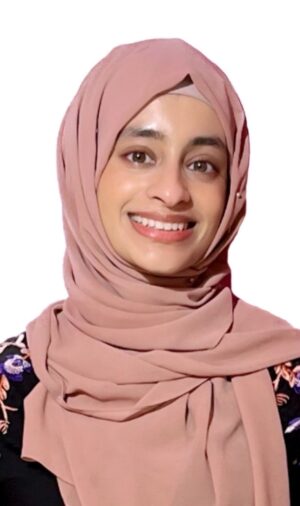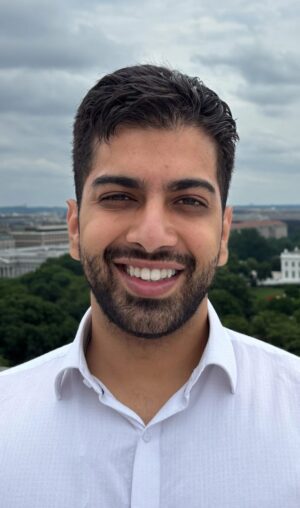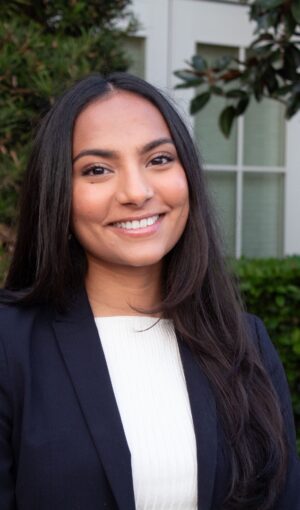This winter, three Harvard Law School students will be the inaugural cohort of interns with a judge of the Supreme Court of Pakistan, based in Islamabad, Pakistan, through a new program facilitated by the Mittal Institute called the HLS J-Term Clinical Internship. Through this internship, students will get an opportunity to attend the court proceedings at the Supreme Court, prepare bench memorandums, conduct legal research, draft opinions, assist the Honorable Justice on complex cross-cutting legal issues, and contribute to the overall functioning of the Chambers. Meet the three winners:
 Rimsha Saeed
Rimsha Saeed
Mittal Institute: What is your year at Harvard Law School, and what type of law do you hope to practice?
Rimsha Saeed: I’m a 2L student. I’m interested in an array of fields: Islamic law, family and property law, and alternative dispute resolution (ADR) – I’m still working on narrowing down which ones I would like to practice in!
Mittal Institute: Why did you apply for this internship?
Rimsha Saeed: I applied for this internship because I’m curious to examine the role of Islamic Law in Pakistan’s legal system and how it interacts with Western and democratic legal principles. Further, given the country’s struggles with stagnant dockets, I’m also interested in exploring where there might be room for ADR in Pakistan’s courts. I’m really interested in exploring contemporary structures that allow Muslim-Americans to navigate both the U.S. and Islamic legal systems.
Mittal Institute: How do you hope this internship will impact your future career goals?
Rimsha Saeed: This clerkship, which similarly takes place at the intersection of Islamic and contemporary legal systems, will provide valuable insight into the practical challenges and daily workings of such structures.
 Hussain Awan
Hussain Awan
Mittal Institute: What is your year at Harvard Law School, and what type of law do you hope to practice?
Hussain Awan: I’m a 3L student, and I intend to practice as a commercial litigator in Washington, D.C., after law school. I’m also excited to work on pro bono matters related to the First Amendment and religious liberty in the United States.
Mittal Institute: Why did you apply for this internship with the Supreme Court of Pakistan?
Hussain Awan: Having clerked for Justice Shah over 1L summer a few years ago, I developed an in-depth understanding of the Pakistani judicial system and the apex court’s functioning. I’m excited to build on those experiences and use my several weeks in Pakistan this time around to help with drafting opinions and otherwise managing active cases on the docket.
Mittal Institute: How do you hope this internship will impact your future career goals?
Hussain Awan: I hope this portion of my clerkship, building off of time spent with the court in 1L summer and as a prelude to a more extended period I plan to spend with the court over the upcoming summer, will give me an intricate understanding of how trial, appellate, and supreme courts operate in a developing world context. Ultimately, I hope these insights will inform my work during my upcoming federal clerkship here in the United States.
 Hurya Ahmed
Hurya Ahmed
Mittal Institute: What is your year at Harvard Law School, and what type of law do you hope to practice?
Hurya Ahmed: I am a 3L student. After graduation, I plan to work in Litigation at a law firm in New York, hoping to specialize in government investigations. I am also very interested in government lawyering and civil rights litigation more generally.
Mittal Institute: Why did you apply for this internship with the Supreme Court of Pakistan?
Hurya Ahmed: Issues of women’s rights, clean water access, and climate justice are among the most important to Justice Shah. Hearing him speak about the progressive work being done at the Pakistan Supreme Court inspired me to apply for a position in his chambers and contribute to the important project. My family is also from Pakistan, so I am excited to see their home country from a new lens.
Mittal Institute: How do you hope this internship will impact your future career goals?
Hurya Ahmed: I think this internship will be incredibly impactful! It will be my first exposure to judicial work, which is unique in the way it approaches law. It will also help me better understand appellate work and whether I would like to pursue a clerkship in the U.S. Finally, I am looking forward to hearing the Justice’s views on particular modes of advocacy to inform my own practice in the future.
☆ The views represented herein are those of the interview subject and do not necessarily reflect the views of the Mittal Institute, its staff, or its steering committee.
